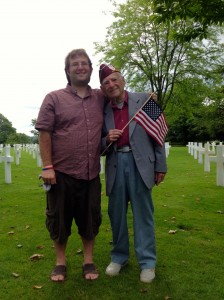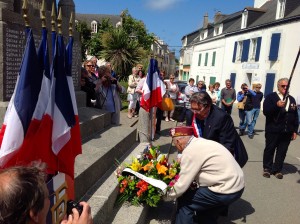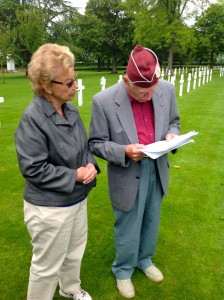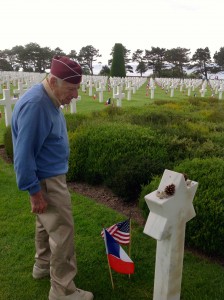Story by Kassondra Granata
Photos courtesy of the Rader family
By Kassondra Granata
On the blistering afternoon of June 6, 90-year-old Bernie Rader sat quietly in the shade waiting for a shuttle to pick him up from the 70th D-Day Anniversary ceremonies at the American Cemetery in Collevile-sur-Mer, Normandy.
Rader, a World War II veteran, was invited to sit on stage during the ceremony and watch as French President Francois Hollande and United States President Barack Obama spoke to the crowd.
“I didn’t really get to see them too well, I was too far in the back!” Rader said laughing as he adjusted his maroon cap. The cap reads, “American POW.” “I did shake President Hollande’s hand, though!”
Rader was not on the beaches during D-Day 1944, but the Long Island man, who was in Normandy this month with family from Glastonbury, has his own important connection to the battles in France. In 1944, when he was 19-years-old, he was deployed into the 94th Infantry Divisions Company K as a rifleman.
“When I was 17 I wanted to fight after Pearl Harbor, but I couldn’t because I was so young,” Rader said.
When he was eventually deployed, however, he got a little help from a friend to make sure he could do what he always wanted to do.
“My eyes were so bad I couldn’t see the eye chart,” Rader chuckled. “But my buddy was behind me and whispered the letters to me and I got in.”
Ambushed
In October 1944, Rader was part of a 55-men patrol deployed into Lorient, Brittany, where they were ambushed by the Germans and forced to surrender after a six-hour battle with machine guns, grenades and mortars. Wounded with shrapnel in both legs and hands, Rader was transported with 148 other men to Ile de Groix by the Germans.
Rader spent time in the hospital while Germans tended to his wounds, but he and the other soldiers were Prisoners of War for 47 days.
“We were not badly treated by the Germans, but we were starving,” Rader said. “We got maybe two slices of bread a day and a little soup, but that was nothing. They didn’t hurt me, but we could not eat.”
Rader, however, had another thing to fear: he was Jewish.
“I was Jewish and the Germans did not know that about me,” Rader said softly. “When I first realized I was going to be captured, I asked my friends to bury my dog tags; I didn’t do it because I was wounded.”
Rader said the Germans never did discover his secret, but there was a time when he was afraid in the hospital.
“When a German officer came up to me in the hospital and asked about me, I didn’t answer some questions. In the army you don’t give anything, just a name, rank and serial number,” said Rader. “He asked, ‘Where are your dog tags,’ and I said, ‘I lost them.’ That was a tough moment then, but nothing happened after that.”
Historic Exchange
Starving to death, one of the captives managed to send out a plea for help, and the American Red Cross got a hold of the note. A volunteer, Andrew Hodges, brought the prisoners food and other provisions. It was Hodges who suggested the POW exchange with the Germans that freed the men.
“This has never happened in WWII,” said June Rader, Bernie’s wife. “Bernie went through an exchange during a six-hour cease fire. While everyone else in the world was fighting and they were being saved.”
The exchange is on the books as the first and only exchange to happen during World War II. Bernie and the rest of the allies were transferred one boatload at a time.
“At the time the Germans knew they were losing, so they just kept it as peaceful as possible,” Rader said. “They knew they would have to pay for it.”
French Generosity
During the time of his imprisonment, Rader recollects French people doing everything they could to smuggle food to the POW’s when the Germans weren’t looking, even if it was an apple.
In order to thank them, Rader spearheaded efforts to raise money for a plaque to thank the French citizens who helped them so many years ago. On the 60th anniversary in 2004, Rader and his family went back to Ile de Groix and placed a plaque in town. The plaque says, “To the people of Ile de Groix, who had so little themselves, yet gave so much to us.”
This year, at the 70th anniversary, Bernie brought his family from Glastonbury, Connecticut to take part in his journey. His family took photos of Bernie sitting on stage and traveled around Normandy to retrace his past with him.
“We went to two cemeteries, one was at Omaha and I walked around,” he said. “We went to another cemetery where we saw some of my old friends that were killed in the war and I said a prayer.”
Rader Family Legacy
Brad Rader, Bernie’s grandson, was one of the family members who traveled with his grandfather earlier this month. Brad said his grandfather is very proud of his war experiences and is always willing to tell his story to anyone who asks.
“When I was younger, anytime we wanted to watch a movie as a family, it had to be a WWII movie,” Brad said and laughed. “Whenever I had to do a school project, I always did one on him.”
Brad said when he traveled around Normandy and other areas with his grandfather, it was emotional for the whole family.
“When he walked around the American Cemetery and the one with his friends buried there, he would just cry and pray for them, even if he didn’t know them,” he said. “Seeing my grandfather cry was difficult, but also really beautiful at the same time. It’s wonderful to see how caring he is. I wish I could have a way to tell his story more; he wants people to know it.”
In 2007, Rader was presented the French Legion of Honor by former French President Nicolas Sarkosy. The Legion of Honor, June said, is the highest award the French government can give to its civilians.
“I tell kids that they must do something for their country; I push that,” Bernie said.
Bernie and June travel to high schools, libraries and JCCs around the country to share Bernie’s story. The couple has also visited high schools in France. They show PowerPoints as well as a documentary, “For One English Officer.” The documentary tells the story of the POW exchange and features live recollections from the original prisoner, including Bernie.
“If you asked me tomorrow, I would do it all over again,” Bernie said looking back at World War II and his service. “If you ask me tomorrow, I will help and do whatever I can. I am proud to be an American.”




